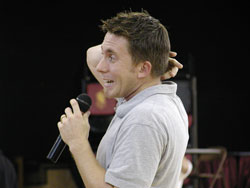Catholic education staff provides many support services

Nationally known chastity speaker Jason Everett promotes the A Promise to Keep program to archdiocesan students. (File photo by Mary Ann Wyand)
By Mary Ann Wyand
Archdiocesan Office of Catholic Education staff members are dedicated to providing a variety of educational support services for parish elementary schools and the archdiocesan interparochial high schools.
Here is a look at some of their educational responsibilities.
School safety
Understandably, parents are concerned about the safety of their children at Catholic schools and parish programs.
G. Joseph Peters, associate executive director of Catholic education, has participated in the Indiana School Safety Specialists Academy since its inception by the Indiana Department of Education in 1999.
“The Office of Catholic Education has held five training sessions for school teams on building state-of-the-art emergency operation plans for schools,” Peters said. “We have scheduled three additional workshops for school safety training. The next workshop is June 10.”
He said the goal is for every Catholic school in the archdiocese to have a state-of-the-art emergency operation plan in place by Dec. 31, 2009.
“All of our schools do have an emergency preparedness plan as required by law,” Peters said, “but this training will enhance the uniformity and the quality … based on an expert Tactical Site Survey in order to provide exemplary school safety preparedness and prevention.”
Education and values
“We’re the third largest school district in the state,” Ron Costello, superintendent of Catholic schools, explained. “We have a very high percentage of students returning each year, about 85 to 90 percent in all of our schools.”
Archdiocesan schools are accredited by the state, and Office of Catholic Education staff members ensure that those requirements are met by school staffs.
“We help the schools with improvement efforts on those things that they identify as their priorities,” Costello said. “In the school improvement plans required by the Office of Catholic Education and the state, most of our school staffs have identified improvements in writing and problem-solving skills as academic priorities. We work with our schools to improve their Catholic identity, and challenges with student enrollment, finances and development.
The fact that we [nurture values] is a real testament to what is taking place in our schools,” he said. “Service to the community is also an integral part of the mission of all our schools.”
Teacher Mentor Program
The Office of Catholic Education is approved by the state to train experienced teachers to be mentor teachers for new educators, who must complete Indiana Department of Education requirements to convert their temporary, two-year license to permanent credentials.
“We do our own mentor training because we’re unique as Catholic schools,” said Rob Rash, associate director of schools, administrative personnel and professional development. “We have more than 150 mentor teachers and over 200 first- and second-year teachers.”
Mentor teachers are required to have a master’s degree and five years of experience, Rash explained. “Those mentor teachers work through their schools to train the new educators.
“During the second year, the new teacher submits a portfolio, is videotaped and also has to show some student work,” he said. “That is all submitted with the help of the mentor teacher to the state Department of Education to convert their temporary license.”
The mentor program increases retention of new teachers, he said, by creating a climate of dialogue between the newer and experienced faculty members that enhances teamwork among the school staff.
Special education and legislative efforts
The number of students with disabilities who are enrolled in Catholic schools has grown in the last six years.
Students with disabilities comprised 19 percent of the Catholic school enrollment in the archdiocese last year, explained Kathy Mears, associate director of schools and learning resources.
“There are 13 legal categories of disabilities,” Mears said, “and we serve children with disabilities in all 13 categories in our schools. We have worked to assist teachers and principals in learning new instructional strategies and ways that we can accommodate additional numbers of students with disabilities in our schools.”
Catholic school students include children who are blind, deaf or hard of hearing, and mild or moderately mentally handicapped, she said, as well as students diagnosed with learning disabilities, communication disorders and autism.
Mears also serves the archdiocese by helping with legislative efforts for special education. She is a member of the state advisory council for special education.
“On Dec. 2, we held the only training that is going to be offered by the state for non-public schools here at the Catholic Center,” she said. “We had over 200 people attend the training session on the new Article 7, which is Indiana’s special education law.”
The archdiocese and the Indiana Catholic Conference, the lobbying arm of the Church in the state are concerned about public funding for special education students in non-public schools, Mears said. “We want to make sure that our students are able to access the funds that they are generating through the state’s special education law.”
A Promise to Keep: God’s Gift of Human Sexuality
Now in its 14th year, the archdiocesan Office of Catholic Education’s peer mentor chastity program continues to achieve excellent results with its faith-based, abstinence education curriculum for middle school students taught by trained high school student volunteers.
Margaret Hendricks, coordinator of adolescent growth programs for the archdiocese, said research by Purdue University’s Department of Sociology found that the program has “substantially increased reported responsibility in decision-making regarding being chaste or abstinent.”
She said a survey of 250 peer mentors in five Catholic high schools indicated that the curriculum also effectively reinforced the teenagers’ commitment to postponing sexual activity until marriage.
During its 14-year history, she said, 7,000 teenage mentors have brought the A Promise to Keep abstinence education curriculum to 65,000 middle school students.
Hendricks, other Office of Catholic Education staff members and a committee of educators recently rewrote the archdiocesan guidelines for sexuality education, which reinforce Church teachings. †
